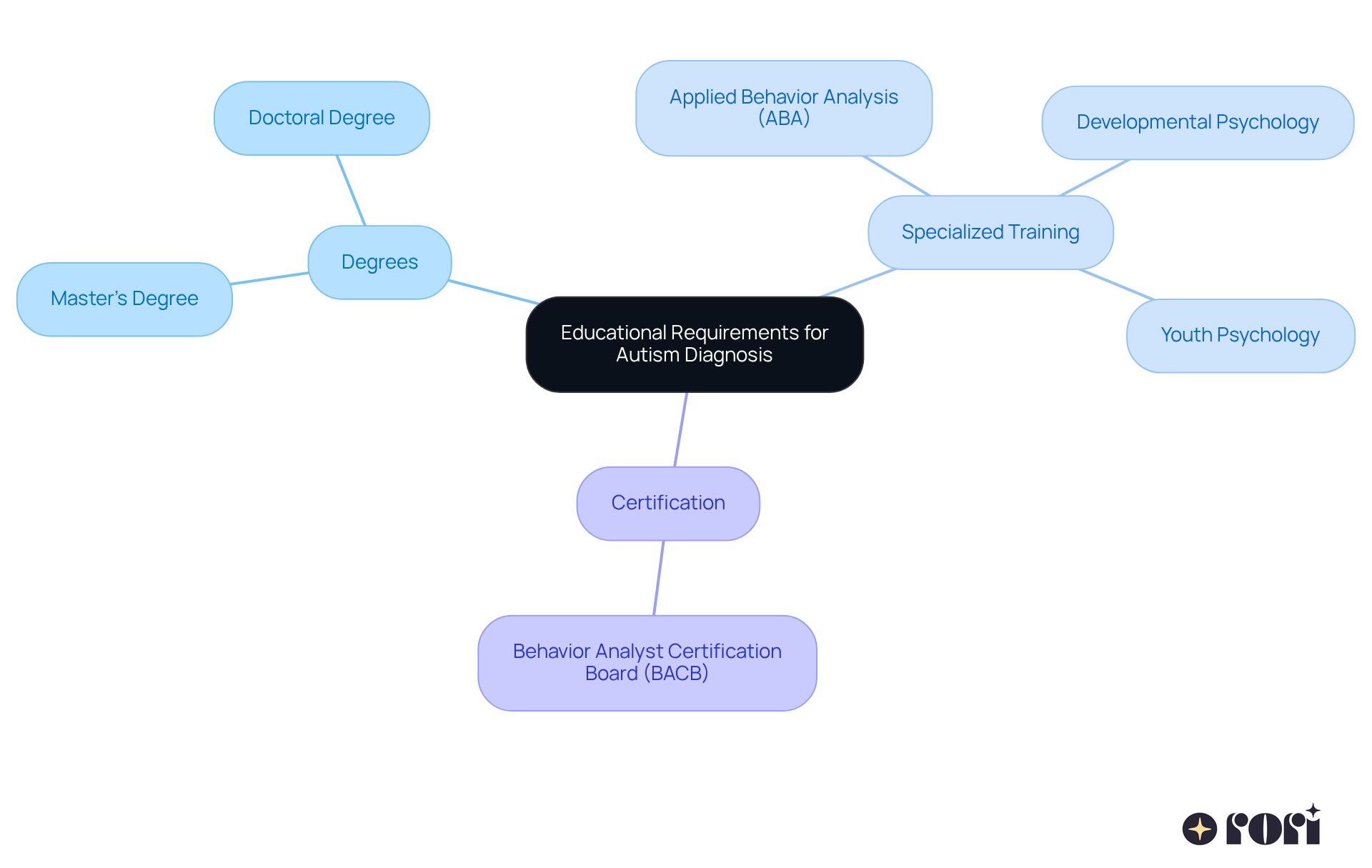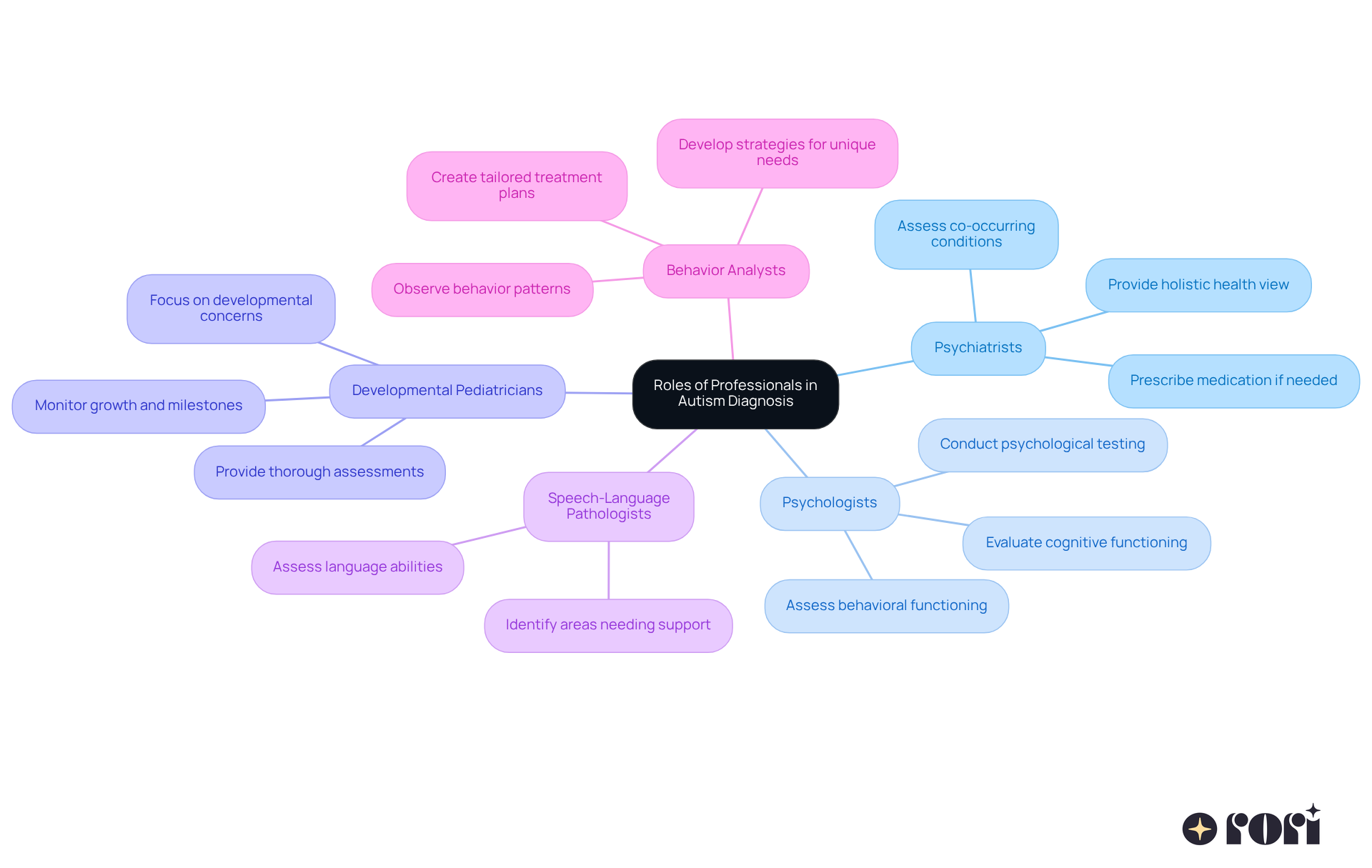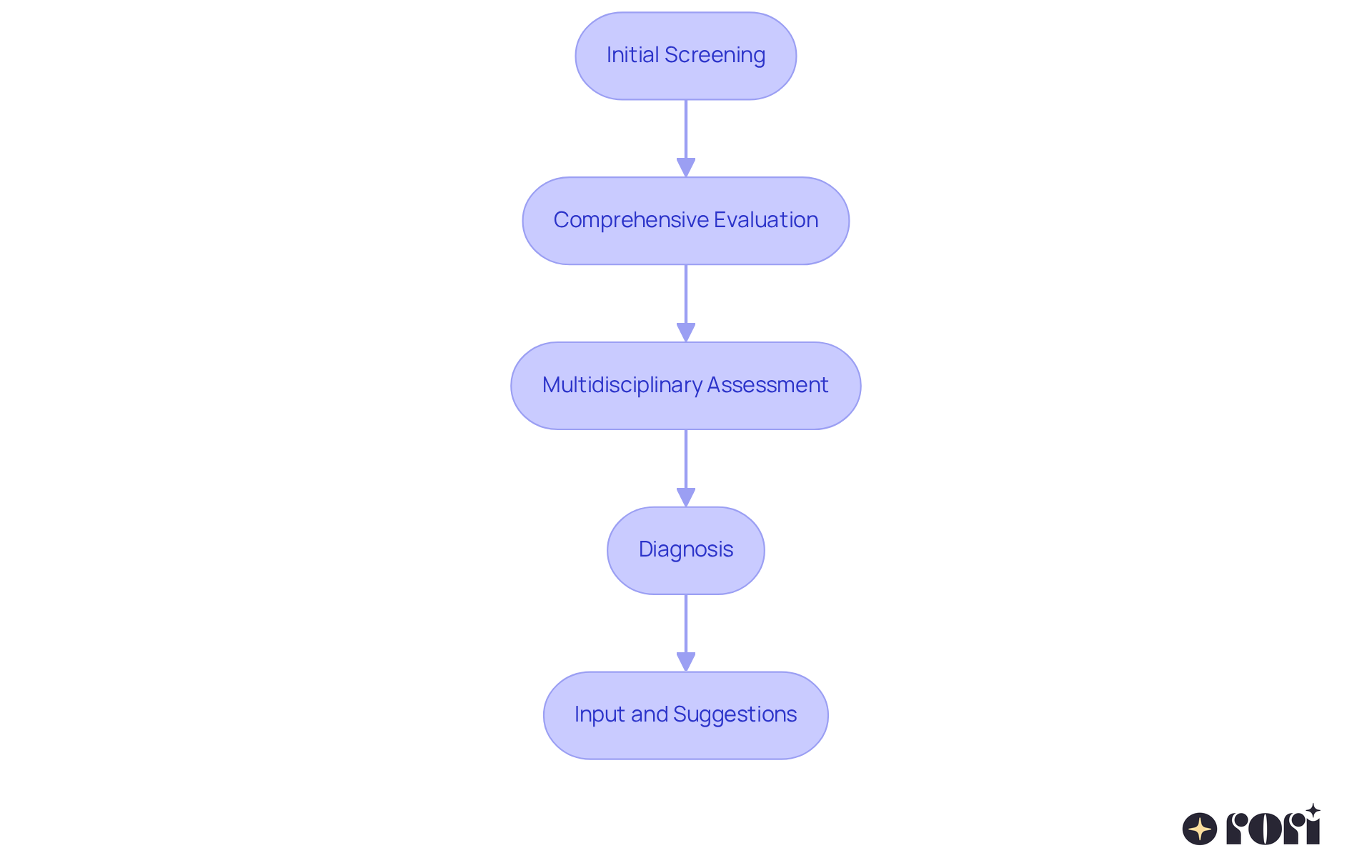When it comes to diagnosing autism, professionals usually need at least a master's degree in psychology, psychiatry, social work, or a related field. Many even go the extra mile, pursuing doctoral degrees and specialized training in applied behavior analysis (ABA). This educational background is super important! It helps practitioners develop the skills they need to carry out thorough evaluations and implement effective, evidence-based interventions. And guess what? This ultimately leads to better outcomes for children with autism.
Let’s explore this together! Understanding the qualifications of those who work with our children can feel overwhelming, but it’s all about ensuring they receive the best support possible. So, if you’re a parent navigating this journey, know that you’re not alone. We’re here to help you every step of the way!
Understanding the complexities of autism diagnosis can feel overwhelming for many parents. With autism spectrum disorder (ASD) affecting 1 in 31 young individuals, it’s no wonder that so many are seeking clarity. Early and accurate diagnosis is key—it opens the door to timely interventions that can truly enhance a child's development and overall quality of life.
But here’s the big question: what qualifications do professionals need to effectively diagnose autism? And how can families navigate this multifaceted process? Let’s dive into the educational requirements and the roles of various specialists. This exploration not only highlights the importance of a collaborative approach but also underscores the urgency of addressing the current delays in diagnosis that can hinder access to essential support.
We’re here to help you every step of the way! Let’s explore this together!
Identifying whether a young person meets the criteria for a spectrum disorder (ASD) according to the DSM-5 can feel overwhelming for many parents. But this process is so important! Early and accurate identification can lead to timely interventions that significantly enhance a child's development and overall quality of life. At Rori Care, our dedicated clinical leadership team values neurodiversity and plays a crucial role in this journey, ensuring families receive the guidance and support they truly need.
When it comes to autism evaluation, it’s all about understanding the spectrum nature of the disorder. This means recognizing the wide range of symptoms and behaviors that can manifest. A multidisciplinary approach, involving various professionals, is essential in the assessment process. It’s a team effort!
The impact of a precise diagnosis on a child's development is profound. Research shows that kids identified early are more likely to benefit from tailored support, leading to improved social skills and greater independence. For instance, a case study on enhancing support for individuals with developmental disorders through home-based ABA strategies revealed that early assistance not only improved behavioral outcomes but also fostered greater family involvement in the therapy process. Isn’t that encouraging?
Did you know that the average age of identification in the U.S. is currently around five years? That’s quite a delay, especially since autism can often be reliably recognized by age two. This lag can really hinder access to those critical early interventions. Plus, the CDC's ADDM Network reports that about 1 in 31 young individuals are recognized with ASD, highlighting the widespread prevalence of the condition and the urgent need for prompt identification.
The importance of an accurate assessment cannot be overstated. It lays the groundwork for personalized treatment strategies that cater to each child's unique needs. As Keith Wargo, a parent and CEO, points out, understanding autism as a spectrum allows for a more nuanced approach to care. This ultimately empowers families and clinicians to achieve better outcomes for children with autism. His journey as both a parent and a leader in the field really emphasizes how early diagnosis and intervention can transform lives.
At Rori Care, we also prioritize caregiver education. We’re here to equip families with the knowledge and strategies they need to support their child’s development effectively. Let’s explore this together! Your journey matters, and we’re here to help you every step of the way!

Diagnosing this condition isn’t just about having the right knowledge; it’s about understanding the journey that families go through. To diagnose autism, professionals must know what degree do you need to diagnose autism, which typically includes a solid educational background in psychology, psychiatry, social work, or similar fields. Usually, a master’s degree is what degree do you need to diagnose autism, but many go on to earn doctoral degrees. To effectively diagnose and treat autism, it is important to consider what degree do you need to diagnose autism, which typically includes specialized training in applied behavior analysis (ABA), developmental psychology, or youth psychology. Plus, understanding what degree do you need to diagnose autism and obtaining certification from recognized boards, like the Behavior Analyst Certification Board (BACB) for Board Certified Behavior Analysts (BCBAs), ensures that these professionals are truly qualified to assess and recommend tailored treatments. This educational foundation equips practitioners with the skills they need to navigate the complexities of the condition and implement evidence-based practices in their evaluations.
The impact of specialized training in ABA is pretty remarkable! Just think about the case studies that show improved diagnostic accuracy and treatment outcomes. For instance, individuals who undergo ABA interventions often make significant strides in social skills and behavioral management. This really highlights how important it is to have well-trained professionals involved in the diagnostic process. Did you know that while the condition can typically be identified by age two, the average age of identification in the U.S. is actually five? This gap underscores the need for prompt and effective assessments by qualified professionals. It’s all about ensuring that young individuals get the support they need as soon as possible.
Let’s explore this together! Education and training play a vital role in making sure families receive the help they deserve. If you’re a parent navigating this path, remember, you’re not alone. We’re here to help you every step of the way!

Diagnosing autism can feel like a journey, and it’s important to consider what degree do you need to diagnose autism, with a team of caring professionals each contributing their unique skills. Let’s take a closer look at who’s involved:
This collaborative approach is so important! It ensures that every aspect of your child’s development is considered, leading to more accurate assessments and effective interventions. Did you know that about 64% of autistic individuals receive ABA therapy? This highlights just how significant it is in both diagnosis and treatment.
The roles of psychiatrists and psychologists are particularly vital, especially when considering what degree do you need to diagnose autism, as they contribute to a large portion of autism diagnoses, blending medical and psychological perspectives into the evaluation process.
But it’s not just about the specialists. Educating caregivers is essential too! When you’re equipped with knowledge and strategies, you can provide even better support for your child, leading to improved outcomes and a sense of empowerment. Autism affects over 75 million people worldwide, making accurate diagnosis and treatment all the more crucial. And here’s something to think about: boys are diagnosed with autism nearly four times more often than girls, which might point to some diagnostic biases.
As Dr. Temple Grandin wisely said, "If you’ve encountered one person with a developmental disorder, you’ve encountered one person with a developmental disorder." Each child’s experience is unique, and that’s something to celebrate!
At Rori Care, our clinical leadership team is dedicated to embracing neurodiversity and supporting children’s success. We’re here to help families navigate challenges and foster development with expertise and compassion. Let’s explore this together!

Navigating the diagnostic process for autism can feel overwhelming, but knowing what degree do you need to diagnose autism can make it a bit easier. Let’s break it down together!
Initial Screening: During routine check-ups, pediatricians often conduct developmental screenings. These screenings are super important because they help catch any potential developmental delays early on, paving the way for timely intervention.
Comprehensive Evaluation: If those initial screenings raise any flags, a comprehensive evaluation is next. This involves interviews, questionnaires, and standardized tests to gather detailed information about your child’s development.
Multidisciplinary Assessment: A team of professionals—think psychologists, speech therapists, and occupational therapists—comes together to evaluate your child’s behavior, communication, and social skills. This collaborative approach ensures that every aspect of your child’s needs is understood.
Diagnosis: Based on all the information collected, professionals will determine if your child meets the criteria for autism spectrum disorder (ASD). Did you know that around 68.4% of youth identified with ASD have recorded assessment statements? This really highlights how crucial comprehensive evaluations are in confirming a diagnosis.
Input and Suggestions: After the assessment, you’ll receive valuable input and suggestions for treatment options. These might include applied behavior analysis (ABA) therapy and other tailored approaches. Rori Care even offers free consultations with Board Certified Behavior Analysts to help families navigate these choices effectively.
This organized method not only ensures a thorough assessment but also guides families toward effective support and resources, ultimately enhancing your child’s development and quality of life, which raises the question of what degree do you need to diagnose autism. Timely detection is key! Studies show that autism can be reliably diagnosed by age 2, yet the average age of diagnosis in the U.S. is around 5 years. This delay can really impact early support opportunities, so it’s vital for parents to advocate for timely screenings and evaluations.
As one specialist put it, 'Receiving an autism diagnosis at a young age can create opportunities for effective interventions that can help answer the question of what degree do you need to diagnose autism and alter a young person's life path.' Plus, empowering caregivers with ABA principles and strategies can lead to better behavioral outcomes and informed decision-making, creating a more positive family dynamic.
Let’s explore this together! We’re here to help you every step of the way!

Identifying autism spectrum disorder (ASD) is a journey that many parents embark on, and it’s crucial to understand the complexities involved. It takes a team of dedicated professionals—think psychiatrists, psychologists, developmental pediatricians, and behavior analysts—working together to ensure that children get the support they need as early as possible.
Throughout this article, we’ve shared some important insights about the value of early and accurate identification of autism. A well-trained team is essential, and it’s reassuring to know that professionals with master’s or doctoral degrees in relevant fields, along with specialized training in applied behavior analysis (ABA) and developmental psychology, are there to help. They’re equipped to provide the best care possible, which is so important for our kids.
Ultimately, the message is clear: timely and precise diagnosis can truly transform the lives of children with autism and their families. By advocating for early screenings and understanding the roles of various professionals, parents can take proactive steps to secure the necessary support for their children. Embracing neurodiversity and prioritizing education and awareness not only enhances individual outcomes but also fosters a more inclusive society where every child has the opportunity to thrive.
So, let’s explore this together! If you’re a parent navigating this path, remember that you’re not alone. We’re here to help you every step of the way!
Why is early identification of autism spectrum disorder (ASD) important?
Early and accurate identification of ASD can lead to timely interventions that significantly enhance a child's development and overall quality of life.
What is the role of a multidisciplinary approach in autism evaluation?
A multidisciplinary approach involves various professionals working together to assess a child, ensuring a comprehensive evaluation of the wide range of symptoms and behaviors associated with autism.
How does a precise diagnosis impact a child's development?
A precise diagnosis allows for tailored support, leading to improved social skills and greater independence. Early assistance can enhance behavioral outcomes and foster greater family involvement in therapy.
What is the average age of autism identification in the U.S.?
The average age of identification in the U.S. is currently around five years, while autism can often be reliably recognized by age two.
What is the prevalence of autism among young individuals in the U.S.?
The CDC's ADDM Network reports that about 1 in 31 young individuals are recognized with ASD, highlighting the widespread prevalence of the condition.
Why is an accurate assessment crucial for children with autism?
An accurate assessment lays the groundwork for personalized treatment strategies that cater to each child's unique needs, ultimately empowering families and clinicians to achieve better outcomes.
How does Rori Care support families in the autism diagnosis process?
Rori Care prioritizes caregiver education, providing families with the knowledge and strategies they need to support their child's development effectively.